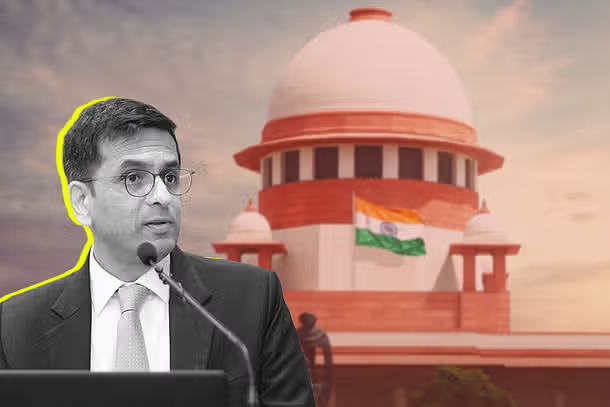While it’s common to witness prayers and good wishes at judicial ceremonies, it’s time we ask a deeper, more pressing question: Who’s praying for the 6 crore pending cases stuck in the Indian judicial system? For years, the backlog of cases in India has remained a national crisis, yet reforms continue to lag behind.
The Chief Justice of India (CJI), while overseeing one of the largest judicial systems in the world, should focus not just on ceremonial duties but on the alarming state of pending court cases. With millions of people awaiting justice—some for decades—the conversation must shift from symbolic actions to addressing the core problem that plagues the judiciary.
A Decades-Old Crisis: 6 Crore Cases and Counting
India’s judicial system is drowning under a backlog of nearly 6 crore cases, clogging the courts at every level—right from the lower courts to the Supreme Court. This backlog has led to a severe denial of justice for countless citizens, many of whom spend years, or even lifetimes, awaiting resolution.
The sheer volume of these pending cases is a wake-up call to the inefficiencies plaguing the system. With 80% of the cases stacked in lower courts, and significant delays seen even in high-profile cases, the speed at which justice is dispensed is shockingly slow.
)
Why Is There Such a Massive Backlog?
India’s case backlog is not just a recent issue; it’s the result of systemic failures that have gone unaddressed for years. But what exactly has contributed to this crisis?
1. Shortage of Judges
India has one of the lowest judge-to-population ratios in the world. While the Law Commission has repeatedly recommended appointing more judges, the process remains mired in bureaucracy. Many judicial positions, especially in the lower courts, remain vacant for years, worsening the backlog.
2. Inadequate Infrastructure
Courtrooms in India are often ill-equipped to handle the massive influx of cases. From outdated technology to a lack of basic amenities in many courts, these inefficiencies result in prolonged hearings and delays in judgments.
3. Complex Legal Procedures
India’s legal system is notorious for its lengthy procedures. Adjournments are frequently granted, legal documentation is often delayed, and many cases drag on due to procedural loopholes. These delays not only pile up cases but also erode trust in the judicial system.
4. Increasing Litigation
With the population growing and economic activities expanding, India has seen a sharp rise in litigation over the past few decades. From property disputes to commercial cases, the number of new cases being filed has skyrocketed, overwhelming an already overburdened system.
The Impact of Delayed Justice on Citizens
The saying “Justice delayed is justice denied” rings especially true for millions of Indians. For many, the long wait for justice is emotionally and financially crippling. Individuals lose faith in the system, and some end up facing further hardships as their lives remain in limbo due to unresolved disputes.
1. The Plight of the Undertrial Prisoners
One of the most tragic aspects of the backlog is the plight of undertrial prisoners. Thousands of people languish in jails, often for minor crimes, simply because their cases haven’t been heard. Many spend years behind bars, waiting for justice that may never arrive.
2. Economic and Social Consequences
For businesses and individuals embroiled in commercial disputes or property cases, the backlog results in significant financial losses. It stifles economic growth, dissuades foreign investment, and often leaves families entangled in generational legal battles.
The CJI’s Role: A Call for Judicial Reforms
While the role of the Chief Justice of India includes upholding the Constitution and delivering landmark judgments, there is an equally important responsibility: to address the judicial inefficiencies that are crippling the system.
Here are a few urgent reforms that the CJI and the judiciary need to focus on:
1. Appoint More Judges
This is perhaps the most critical step. With thousands of judicial positions lying vacant, the system is doomed to fall further behind. Appointing judges at every level, especially in the lower courts, will go a long way in speeding up cases and reducing the backlog.
2. Embrace Technology
Modernizing the judicial system by incorporating technology is no longer optional—it’s essential. E-courts, online filings, and virtual hearings can significantly reduce delays, cut down administrative time, and make the system more efficient.
3. Fast-Track Courts for Pending Cases
Setting up fast-track courts for long-pending cases, especially for those involving undertrial prisoners and family disputes, will ensure that justice is delivered swiftly to those who need it most.
4. Judicial Accountability
The judiciary must also be held accountable for its delays. Regular audits, performance reviews, and establishing a system that holds judges responsible for unnecessary adjournments could deter further delays.
The People’s Prayer: Justice That’s Timely and Fair
It’s high time the judiciary shifts its focus from ceremonial gestures to the core issue at hand—delayed justice. While symbolic acts and prayers may offer moments of reflection, the real prayers of the people lie in the courts, where 6 crore cases await resolution.
The question remains: Will the judiciary rise to the challenge, or will the system continue to crumble under its own weight? It’s time for concrete action, not just symbolic prayers, if we want to see true reform and restore faith in India’s judicial system.

